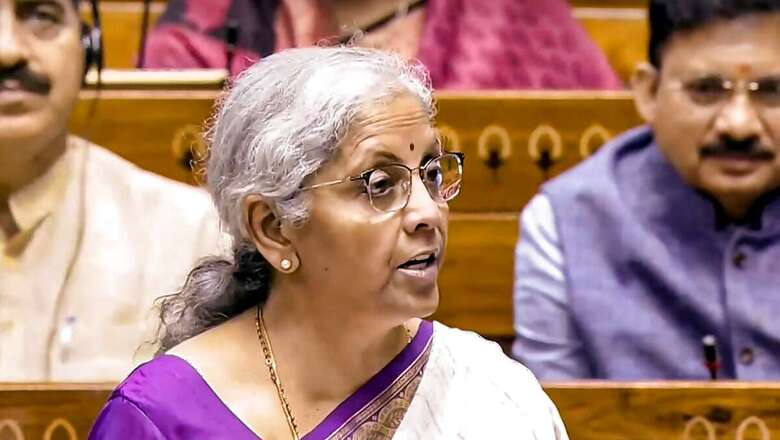
views
Something is rotten in the state of economy; that rot is not allowing the creation of a good number of quality jobs. One need not be an economist to know that the unemployment problem is a direct fallout of inadequate private investment. Both the Economic Survey and Budget 2024-25 have dwelt a lot on the two issues; the latter came up with specific programmes to boost employment generation. The issues, however, are intricately linked with not just economic policy but also governance, so the solutions must be holistic.
On her part, Finance Minister Nirmala Sitharaman offered schemes to facilitate employment, skilling, and other opportunities for 4.1 crore youth over a five-year period. While she expects cooperation from private enterprises, she made it clear that the government intends to nudge the corporate sector and micro, small and medium enterprises (MSMEs) to speed up hiring. “Companies will be nudged to do this because it is these companies that often tell us that they are not able to get employable, skilled, industry-ready, qualified people,” she told a newspaper in an interview after the Budget.
She also laid considerable emphasis on formalisation. One of the new schemes she announced is predicated upon the registration of first-time employees with the Employees Provident Fund Organisation (EPFO).
But employment in general is also predicated upon youngsters’ skillsets—and it is here where the shoe pinches. An online talent assessment company conducted a study a year ago, and found that only 45 per cent of Indian graduates who apply for jobs are employable. Also, about 53 per cent of graduates are employable for top non-technical jobs, it said. More than half of Indian applying for artificial intelligence/machine learning (AI/ML) roles are not job-ready
Anecdotal evidence also suggests that a large number of graduates lack basic skills like communication and simple mathematics. This is not surprising if one looks at the ASER report’s main findings. Pratham, a not-for-profit learning organisation aimed at improving the quality of education, brings out the Annual Status of Education Report (ASER report)—a household-based survey that collects information on children’s schooling status and basic learning outcomes in almost every rural district in the country.
The 2023 ASER report found that only 43 per cent of all youth can do simple division problems. In the 14-18 age group, only 37 per cent could tell how much a T-shirt would cost after a 10 per cent discount. Just 57.3 per cent can read English sentences. Of those who can read, 73.5 per cent can understand the meaning of the sentence. Even in Hindi, only 73.6 per cent of all youth in the age group can read the passage of the level of standard II.
Evidently, our schools—especially government schools where most students study—are not doing a very good job. They are not preparing the youngsters to carry out routine tasks, let alone preparing them to get good jobs.
Our political masters may have done some good work to improve the conditions in schools, but there is not much to show in terms of results. The media and social media are replete with reports about absent teachers (especially in rural areas), lack of basic amenities, etc., in schools.
Therefore, it is not surprising that India Inc complains about the shortage of competent, educated workforce. The complaint is not incorrect, but it should also do a little bit of introspection as to why so many educated youth are fascinated with government jobs. A researcher in an article in a Delhi-based newspaper recently pointed out that educated youngsters often find the atmosphere in private offices toxic, with bosses behaving in a rude and uncouth manner. Private employers can do a lot to improve their HR practices.
FM Sitharaman has offered sops to the private sector to hire more people. Since nobody says no to sops, it is likely that the employers would grab the benefits for any hiring they do which they would have done anyway.
The quantum leap in good quality jobs can come only when there is a quantum jump in private investment. The Economic Survey said that “while it remains the government’s responsibility to facilitate the development of infrastructure and address logistical challenges, it is incumbent upon the private sector to take forward the momentum in capital formation on its own and in partnership with the government.”
That’s correct, but “partnership with the government” should not be just a slogan; it must become symbiotic rather than symbolic; government-business interaction should be meaningful in which the concerns of businesspersons are addressed in earnest. For instance, the skilling of 20 lakh youth and upgrade of 1,000 industrial training institutes in the next five years, as announced by the Finance Minister in her Budget speech, should be done with active participation of industry. Importantly, the partnership should not be reduced to a few publicised events.
Further, revamp of the entire education system should be planned and executed in consultation with all stakeholders. It will go a long way in preparing youth for quality jobs.
The author is a freelance journalist. Views expressed in the above piece are personal and solely those of the author. They do not necessarily reflect News18’s views.




















Comments
0 comment